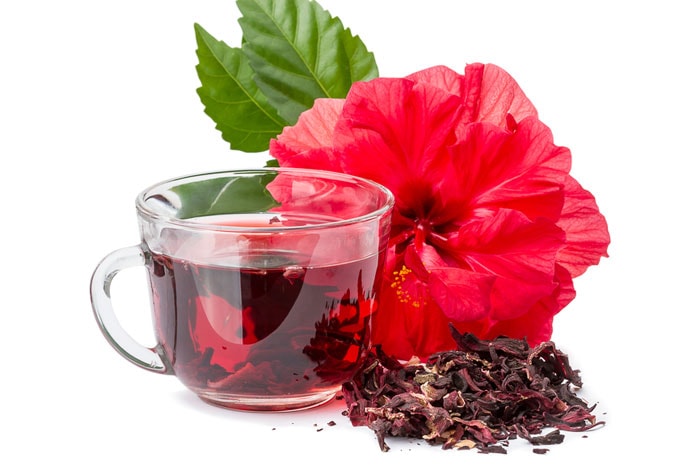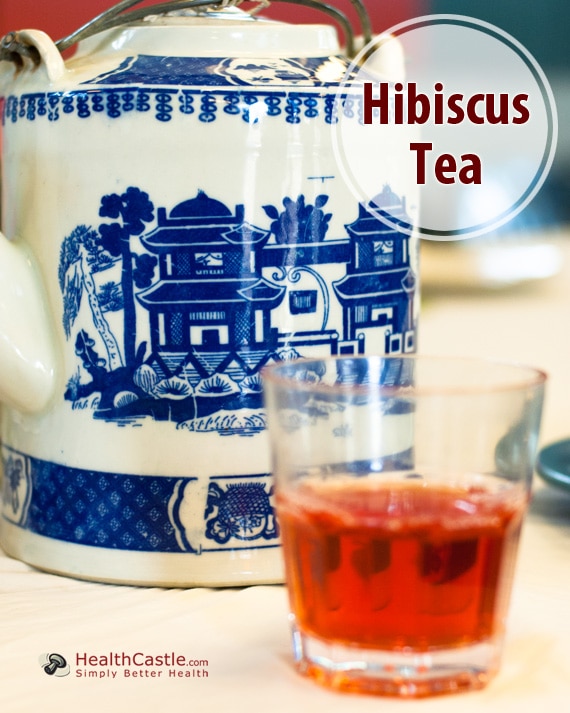
Written By: Gloria Tsang, RD
Title: Founding Registered Dietitian
Alumni: University of British Columbia
Last Updated on:

I was in Hong Kong for my Chinese book launch last month. Some days I was working from dusk until midnight, but some days I was quite free to roam in the city. On a scorching hot day, I visited Zen Organics, an organic farm, where the owner served me a cup of hibiscus tea. After drinking a sip, I told myself I had to write about this tea upon my return home.

For decades, research efforts focused on studying the health benefits of black and green tea. Herbal tea, which should technically be called tisane, was not well studied. Fortunately, more interest groups and scientists are starting to investigate this brightly colored tropical flower and, fortunately, some health benefits have been unearthed.

Table of Contents
One cup of hot hibiscus tea contains:
Many websites claim numerous health benefits, from skin clearing to regulating fluid balance, to cholesterol lowering. I prefer to look at documented scientific research. At the time of publication, the most promising health benefit of hibiscus tea is blood pressure lowering. Animal studies have consistently shown that hibiscus tea extract can lower blood pressure in a dose-dependent manner. In human studies, drinking a cup of hibiscus tea a day has been shown to significantly lower both systolic and diastolic blood pressure in adults with hypertension and type 2 diabetes. Two studies compared hibiscus tea head-to-head with black tea and found it more effective than black tea in lowering blood pressure. Interestingly, two studies also compared hibiscus sabdariffa to the blood pressure medications Captropril and Lisinopril. The results showed that hibiscus tea was as effective at lowering blood pressure as Captropril, but less effective than Lisinopril.
Its health benefit likely originates from an antioxidant from its bright red flowers. Anthocyanins, potent antioxidants, are often found in bright red foods like strawberries and watermelon. Just another reason to love your reds!
Other studies also investigated hibiscus tea’s potential cholesterol-lowering effects on total cholesterol, HDL cholesterol, LDL cholesterol, and triglycerides; the results have been quite inconsistent. Overall, one review study reported that hibiscus tea did not produce any significant effect on any of the outcomes examined, when compared with placebo, black tea, or diet.
If you find dried hibiscus flowers at a natural food store, you can use 1 tsp of dried flowers to every cup of boiling water.
I also came across a video on YouTube on making the tea with fresh flowers. Enjoy!
Alumni: University of British Columbia – Gloria Tsang is the author of 6 books and the founder of HealthCastle.com, the largest online nutrition network run by registered dietitians. Her work has appeared in major national publications, and she is a regularly featured nutrition expert for media outlets across the country. The Huffington Post named her one of its Top 20 Nutrition Experts on Twitter. Gloria’s articles have appeared on various media such as Reuters, NBC & ABC affiliates, The Chicago Sun-Times, Reader’s Digest Canada, iVillage and USA Today.
healthy every month, hibiscus tea, lower blood pressure, tea